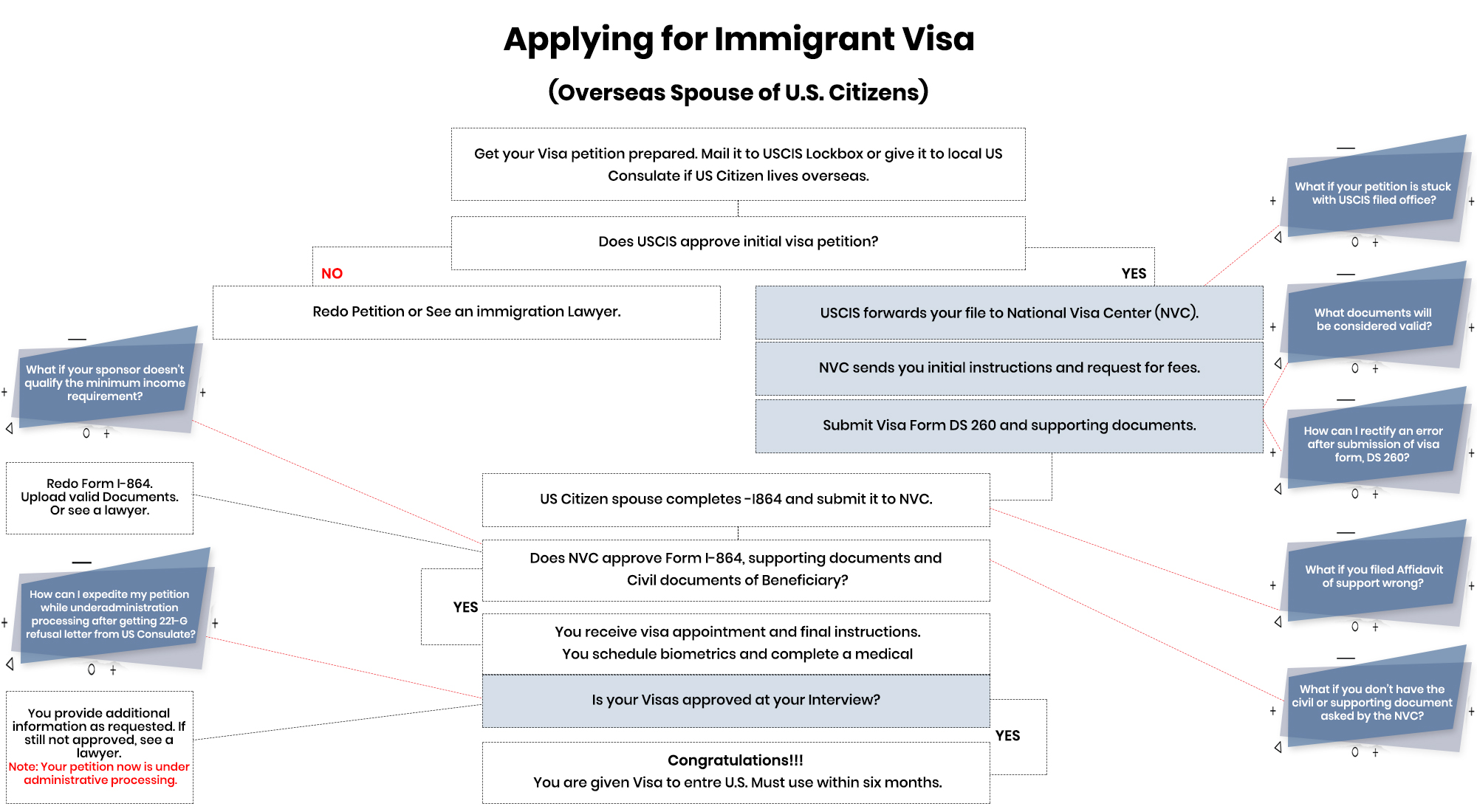FAQ Counsellor Processing
FREQUENTLY ASKED KNOWLEDGE BASED QUESTIONS
What is Consular Processing?
Consular Processing refers to the process by which an individual applies for an immigrant visa at a U.S. Consulate abroad. This typically occurs after an immigrant visa petition has been approved and a visa number is available. The U.S. Consulate will schedule an interview for the applicant and family members to appear in person at the consular post.
When do I decide if I want to do Consular Processing or Adjustment of Status?
The I‐130 specifies whether the individual will file for Adjustment of Status or Consular Processing. Mostly people select Consular Processing at the time of filling I-130 Family based petition. If you get the U.S visa after filling and you want to adjust status, you may still do so if you are eligible. However, if you chose Adjustment of Status on the I‐130 and then decide you want to do Consular Processing, You must contact our office.
What are the Consular Processing steps?
Once the I‐130 family based petition is approved USCIS will forward the approval notice and the file to the National Visa Center (NVC). If your priority date is current, the NVC will assign your file a case number and forward it to the consulate office abroad.
At that time, the NVC will also send welcome letter to our office for an immigrant visa processing (DS-260) and general instructions on supporting documentation. This initial application is referred to as DS-260. We will then be required to complete and file DS-260. Once the NVC receives the principal applicant and other family information and supporting tax documentation, NVC will forward the file to your Home country Consulate office. Consulate Office will schedule you for an interview. The consulate will notify you of the time and date of the scheduled interview. kindly visit our website page for more information
What if my priority date is not current when the I‐130 is approved?
If the I‐130 is approved by USCIS and the priority date is not current, the I‐130 approval notice and file will be stored at the NVC until the priority date becomes current. When it becomes current, the NVC will send you welcome letter for paying the DS-260 Fee and will ask to upload the legal information and sponsor’s tax related documents after that NVC will forward the file to the designated consular office abroad.
Can I remain in the U.S. while waiting for my interview at the Consulate if i have filed Adjustment of status (I-485)?
You may either wait in the United States.
Can I apply for Consular Processing at any Consulate in the world?
Typically, you must apply for Consular Processing at the U.S. Consulate in your country of nationality or country of last residence.
What will I be asked at the interview?
Generally, the consular officer will review the information you have submitted in DS-260 They may ask you the same questions again or may seek clarification. Typically, they will ask questions about your family , your job , and about your sponsor.
Can I change my country before my interview?
If your immigrant visa petition is family based you should not change your country before the interview because your interview can be conducted in your home country only
What documents do I need to take to the interview?
Each Intended immigrant has to carry certain personal documents such as passports, birth certificates, police certificates, and other civil documents, as well as evidence that they will not become public charges of the United States. You will receive a list of documents you will need from the NVC. You may also check your Country Consulate website where you will be interviewed for information.
Do I need a medical examination?
Yes, United States immigration law requires immigrant visa applicants to obtain a medical exam and certain vaccinations prior to the issuance of an immigrant visa. Payment and the fee for the medical examination vary among approved hospitals. You must check with each Embassy’s website to obtain a list of approved doctors and hospitals as well as specific instructions regarding the timing of the medical exam.
What happens if I am pregnant at the time of my medical exam?
There are few tests that pregnant female cannot complete. Only a USCIS approved doctor can determine which of the true vaccinations are medically appropriate, given age, medical history, and current medical condition. The applicant may check with the doctor at the time of the medical exam.
What are some reasons I may be denied an immigrant visa?
The immigration laws of the United States prohibit the issuance of a visa to certain applicants. Examples of applicants who are refused visas are those who have a communicable disease such as tuberculosis or have a dangerous physical or mental disorder ,drug addicts , committed serious criminal acts , crimes involving moral turpitude, drug trafficking, and prostitution or procuring, terrorists, subversives, members of a totalitarian party, or former Nazi war criminals are likely to become a public charge in the United States, or have used fraud or other illegal means to enter the United States.
If you believe that any of these situations may apply to you, please contact our office by email or call. info@f4india.com
Please note that the wilful misrepresentation of a material fact in connection with a visa application may also result in a permanent ban to enter the United States, or deportation if already admitted into the United States.
How much is the DS-260 fee?
The cost of each immigrant visa application is $325. and the Affidavit of Support (AOS) fee is $120.
What happens after the immigrant visa is approved?
Once the immigrant visa is approved, generally, on the same day of the interview or within a few days of the interview, it is normally valid for travel to the the United States for six months from the date on which it is issued. The validity period cannot be extended. If any reason, the applicant is unable to use the visa, it should be returned to the Embassy with a cover letter indicating whether or not the holder wishes to immigrate to the United States. A new visa will only be given if the individual is able to establish that the reason for not traveling to the U.S. during the validity period of the visa was due to circumstances beyond his/her control.
What happens once I enter the U.S. as an immigrant visa holder?
The immigrant visa is surrendered to an officer of U.S. Customs and Border Protection at the port of entry, at which time the holder will be given the forms required to complete an application for an Alien Registration Receipt Card (ARC), commonly known as a Green Card. That card will normally be mailed to the address of your final destination in the United States at a later date. Your passport will be stamped to show that you have been admitted as a Lawful Permanent Resident and that an application for an ARC is being processed. If you depart the United States before receiving the ARC, you may re-enter the U.S. on the stamp in your passport.
Do my spouse and family have to enter the U.S. at the same time that I do after the interview?
Your family must either travel with you when you first enter the U.S. following the interview or they can enter after you
How long will it take for me to get my Green Card in the mail?
Processing timesvary, but it is currently taking approximately 2‐3 months from the application to receiving the card.
What is a sailing permit?
The tax law requires almost all aliens departing the U.S. (except those with B visas) to obtain a certificate of compliance with U.S. tax obligations. This certificate of compliance is commonly called a "sailing" or "departure" permit. You use IRS Form 2063 to apply for it. To obtain a sailing permit, you must apply no earlier than 30 days and no later than two weeks before departure by filing with the IRS either a Form 1040C (if he or she has or expects to have taxable income for the current year) or Form 2063 (if he or she had or expects to have no taxable income for the current year). An application may be made at a district IRS office nearest the place of employment or departure. Generally, an alien departing the U.S. must pay all taxes currently due as well as all back taxes, unless he or she can show that he or she intends to return to the U.S. and satisfy his or her tax liability. The sailing permit requirement applies to resident aliens as well as nonresident aliens. Please direct additional questions regarding sailing permits to your accountant or the Internal Revenue Service. Finally, please note that the sailing permit requirement is not uniformly enforced and that it is rarely an issue at immigrant visa interviews.

